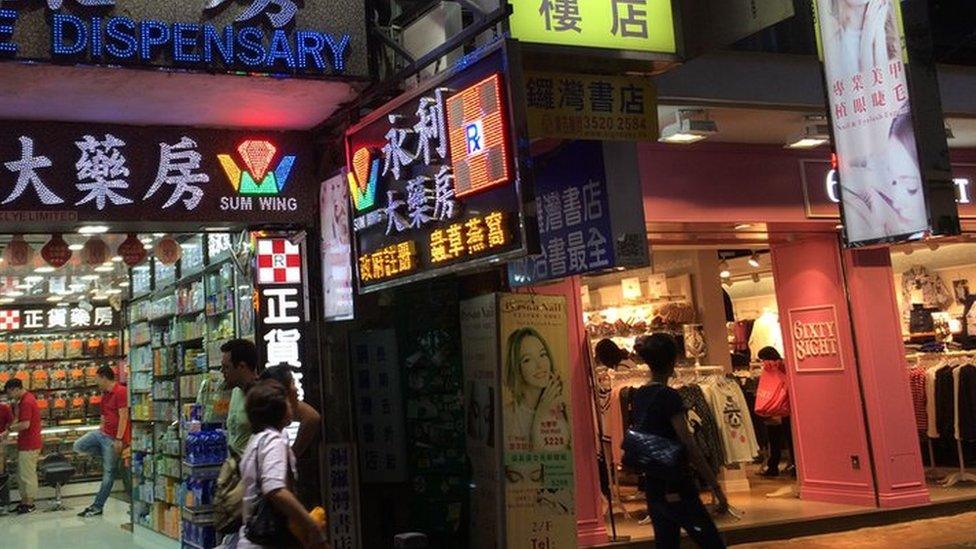Hong Kong bookstore disappearances shock publishing industry
- Published

The bookshop is marked by a small blue sign, sandwiched between shops selling vitamins and clothing
In a frenetic commercial district of Hong Kong, sandwiched between shops selling vitamins and clothing to tourists, the Causeway Bay Bookstore touts itself as the authority on Chinese politics.
The tiny shop specialises in selling gossipy paperbacks that are highly critical of China's leadership. They are particularly popular with mainland Chinese visitors who cannot buy the banned books at home.
But two weeks ago, four men who work for the bookstore and its affiliated publishing house went missing. Their colleagues believe they have been detained by Chinese officials because of their work.
One of their associates, Mr Lee, told 大象传媒 News: "I suspect all of them were detained. Four people went missing at the same time."
Among them is Gui Minhai, a China-born Swedish national who is the owner of Mighty Current, the publishing house that owns the bookstore.
Forthcoming book
According to Mr Lee, who declines to give his full name for fear of reprisals by Chinese officials, the publisher last communicated with colleagues via email on 15 October from the city of Pattaya in Thailand, where he owns a holiday home.
Mr Gui had written to tell printers to prepare for a new book and that he would send the material shortly. He has not been seen since.
The others are Lui Bo, general manager of Mighty Current, and Cheung Jiping, the business manager of the publishing house. Both have wives who live in Shenzhen, and were last seen there.
Lui Bo, general manager of Mighty Current publishing house, is among those missing
The fourth missing man is Lam Wingkei, manager of the bookstore, who was last seen in Hong Kong.
"I am quite certain that the main target was Mr Gui. They wanted to prevent him from publishing that book," said Mr Lee, who was not privy to what the publisher had been writing about.
"I think the others were taken because they thought the contents of the book had already been distributed."
'Deeply troubling'
Mr Lee said Mr Lam's wife had filed a missing persons report with the Hong Kong police, who have confirmed the case to the 大象传媒.
Calls to China's Foreign Ministry office in Hong Kong have gone unanswered. Attempts to reach the relatives of the four men have been unsuccessful.
The tiny shop sells paperbacks that are highly critical of China's leadership and banned in mainland China
Sources close to the families fear international attention may hurt more than help.
Rights groups have expressed concern about the disappearances.
"We think that if the information is true, it is a deeply troubling case and it will have serious implications about the deterioration of freedom of expression in Hong Kong," said Amnesty International's China researcher Patrick Poon.
Government influence?
Freedom of the press is guaranteed in Hong Kong. But many in the publishing business say the Chinese government has begun to exert its influence in the industry.
Last year, Hong Kong publisher Yiu Mantin was sentenced to ten years in prison in China on smuggling charges.
His family believes the charges were trumped up, in retaliation for publishing a book highly critical of President Xi Jinping.
And last week, two Hong Kong journalists were on trial for selling political magazines in Shenzhen.
"The unfortunate coincidence of the report of the disappearances and the detention of Wang Jianmin and Guo Zhongxiao have cast a shadow on freedom of the press, a right enshrined in Hong Kong's Basic Law," said Bruce Lui of the Independent Commentators Association.
The Chinese government has so far shed no light on the whereabouts of the missing men. But their disappearance has already sent jitters through Hong Kong's publishing industry.
- Published27 September 2015